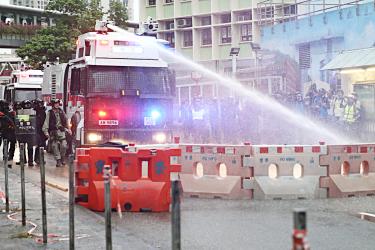Police in Hong Kong yesterday used tear gas to clear pro-democracy demonstrators who had taken over a street and brought out water cannon trucks for the first time in the summer-long protests.
The skirmish on a main drag in the Tsuen Wan district in the New Territories followed a march that ended in a nearby park.
While a large crowd rallied in the park, a group of protesters took over a main street, strewing bamboo poles on the pavement and lining up orange and white traffic barriers and cones to obstruct police.
After hoisting warning flags, police used tear gas to try to disperse the crowd. Protesters responded by throwing bricks and gasoline bombs toward the police.
The result was a surreal scene of small fires and scattered paving bricks on the street between the two sides, before the protesters abandoned their position.
Two water cannon trucks and a phalanx of police vehicles with flashing lights joined riot police on foot as they advanced up the street. They met little resistance.
Television footage showed a water cannon being fired once, but perhaps more as a test, as it did not appear to reach the protesters.
Later in the evening, a Hong Kong police officer fired at least one gunshot in Tsuen Wan, the first time a live round has been used during three months of protests.
“According to my understanding, just now a gunshot was fired by a colleague... My initial understanding was that it was a uniformed policeman who fired his gun,” a Hong Kong police officer said.
Prior to the skirmishes, tens of thousands of umbrella-carrying protesters marched in the rain.
Many filled Tsuen Wan Park, the endpoint of the rally, chanting, “Fight for freedom, stand with Hong Kong,” the South China Morning Post reported.
The march in the New Territories started near the Kwai Fong train station, which has become a focal point for protesters after police used tear gas there earlier this month. Police with riot gear could be seen moving into position along the march route.
Police yesterday said they arrested 29 people on Saturday for various offenses, including unlawful assembly, possession of offensive weapons and assaulting police officers, after a large group of protesters clashed with police after a march in the Kowloon Bay neighborhood, building barricades and setting fires in the streets.
Ten people were left in hospital after Saturday’s clashes — two in a serious condition — staff said, without detailing if they were police or protesters.
Meanwhile, the territory’s metro system, the MTR, is the latest business to face public censure, after appearing to bend to Chinese state-media attacks accusing the system of being an “exclusive” service to ferry protesters to rallies.
The MTR yesterday shut stations near the main demonstration area in Tsuen Wan, in the second day of station closures in a row.
A second rally of a few hundred, some of them family members of police, yesterday criticized the government for leaving officers to handle the brunt of the crisis, while also calling for an independent investigation into the police handling of the protests.
“I believe within these two months, police have got enough opprobrium,” said a woman who asked not to be named and said she was a police officer’s wife.
“I really want you to know even if the whole world spits on you, we as family members will not. Remember, your job is to serve Hong Kong residents, not be the enemies of Hong Kong,” she said.
Source: Taipei Times - 2019/08/26





















